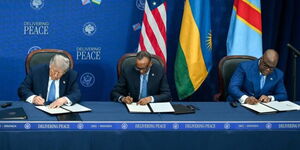Deputy President William Ruto is considering three proposals from his economic advisor David Ndii which would form part of his bottom-up economic revival and 2022 manifesto.
Ndii, on Saturday, May 8, disclosed further details of his Maasai Mara retreat with Ruto and Mt Kenya politicians. Freebies were part of the economist's presentation to Ruto with Murang'a Senator Irungu Kang'ata adding that the enticements would be used as the driving force in their 2022 succession plan.
"I proposed three issues to be added to the blueprint - free healthcare, deregulation of the economy to spur growth and free lunch to school children," Ndii told Nation.
He, however, did not divulge how Ruto would accomplish the tasks and the budget that would be set aside to cover the freebies.
Questions will be raised on how Ruto will offer free lunch to school children, especially after the Jubilee government failed to provide free laptops to students as promised. The information technology agenda was part of President Uhuru Kenyatta's and his deputy, William Ruto's 2013 manifesto.
Uhuru’s allies revealed that the laptop agenda was Ruto’s brainchild, adding that the President spent his own money to cover the DP's mess. Jubilee Vice-Chairman, David Murathe, said that the initial budget was misappropriated by the office of the DP as those who won and reportedly embezzled the tender were linked to Ruto.
“Children are very unforgiving. How can you promise them laptops and not deliver? It reached a point where the President funded the project using his own resources to revive it. When it comes to the stadiums, Uhuru also had to intervene,” Murathe stated on Thursday, January 28.
Ruto has, nonetheless, been vocal on matters of healthcare to the point of criticising the government for focusing on changing the constitution through the Building Bridges Initiative (BBI) rather than combating the Covid-19 pandemic.
The deregulation of the economy is centred on the reduction of government power to create more competition within the industry. This is aligned with Ruto's bottom-up approach which he argues is better than the trickle-down economy which excludes millions of Kenyans.
"Trickle-down has failed to create enough jobs, expand opportunities and bring prosperity. Instead, it has fostered a hostile environment that has made it difficult for enterprise, trade, business, creativity and initiative to thrive.
"The most important conversation is on the empowerment of small businesses, increasing farmers’ earnings and creating an enabling environment that rewards hard work, nurtures creativity and promotes initiative for all to flourish," he explained, on Sunday, May 2, after meeting his allies in Maasai Mara.
His bottom-up approach is centred on uplifting the common mwananchi who will have an influence on the government agenda. Ruto structured his framework into three parts for discussion.
These are; empowerment of small businesses, increasing farmers’ earnings and creating an enabling environment that rewards hard work. Creating a framework of engagement beginning at the grassroots with hustlers and bringing aboard professionals and experts to facilitate this comprehensive, all-encompassing national engagement.












